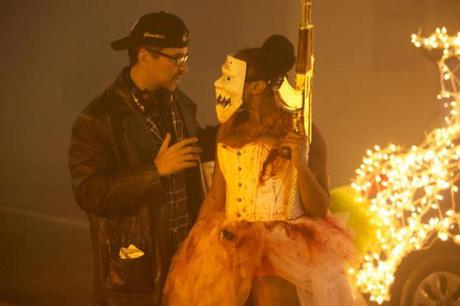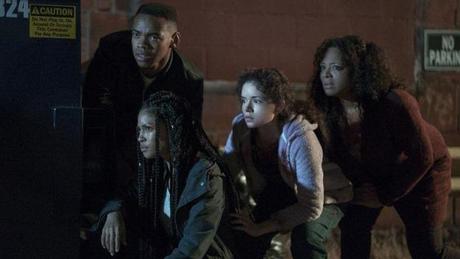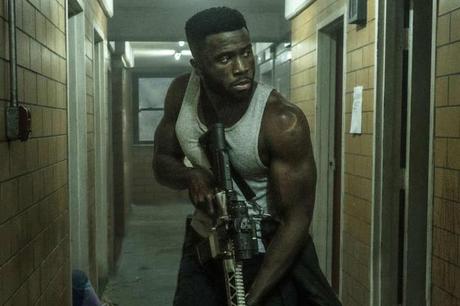According to a r ecent Rasmussen poll, a third of all Americans and nearly half of all black Americans think a second civil war is likely within the next 5 years. Various political scientists, like Cambridge's David Runciman, believe we are witnessing the death of democracy, with people increasingly reduced to "passive consumers of a spectacle, rather than citizens of an active democracy." Economists fear Trump's trade war, should it continue to escalate without end, will lead to a worldwide recession.
The sky, she be a'falling.
Debate any of the above points however you see fit, but it all contributes to a pervasive sense of dread and uncertainty infecting every aspect of American life. It is into this environment that Universal and Blumhouse releases The First Purge, the prequel to the once improbable-sounding franchise about a nationwide night of sanctioned lawlessness.
The real-life backstory goes like this:

A near-death experience caused by the reckless actions of a drunk driver on the roads of Brooklyn led writer-director James DeMonaco's wife to vent, "I wish we all one free murder a year." Demonaco had never heard his wife, a doctor, speak like that before, and it stuck with him. They eventually moved to France for a year, and living abroad where no one they encountered owned or even wanted to own a gun opened DeMonaco's eyes to America's ingrained gun culture. Later, Hurricane Katrina struck, and the Bush administration's woeful response to the plight of lower-income citizens caused Demonaco to finally put all of the elements together in dreaming up an authoritarian U.S. government which uses a night of legalized crime to cull the masses.
The resulting The Purge script, a glorified home invasion horror story focused on a rich, white family's fight to survive the night, was shopped all over town before landing with Jason Blum, who had recently signed a deal at Universal authorizing him to produce whatever movies he wanted as long as they cost less than $5m. He gave DeMonaco $3m to make Purge.
Five years later, the franchise, now entering its fourth installment, has grossed over $300m worldwide against a combined budget just south of $25m. Beyond that, it has become a beloved addition to Universal's Halloween Horror Nights theme park attraction, and there's now a 10-episode TV series in the works to air on USA.
The second and third films, both written and directed by DeMonaco, upped the social commentary considerably by expanded outward to focus on a cop (Frank Grillo) who lost his son to The Purge and a female politician (Elizabeth Mitchell) campaigning to end The Purge once and for all. As Horrorhound put it, the films function as "cautionary tale for how a nation can lose its soul." But we've never actually known how exactly The Purge came about, other than through the actions of a new political party (the NFFA) which rises to power by selling lies and white nationalism.
The First Purge is supposed to finally give us that answer, but it doesn't. Not really. By the start of the film, The Purge concept has already been devised as an experiment by a social psychologist (Marisa Tomei, with Maria Bello hair, for some reason). We are mere days away from the start of the experiment's pilot phase in Staten Island, where those with any real money have chosen to spend the night elsewhere and those without money - like community organizer Nya (Lex Scott Davis) and her brother Isaiah (Joivan Wade) simply shelter in place. The government has promised to pay five thousand dollars to anyone who stays, should they survive the night, of course. If they go out and actually kill, they'll get paid even more.

What eventually transpires is essentially that second civil war so many are afraid of, just exclusively fought between white nationalists and people of color. See, the experiment doesn't work. Sure, a couple of murders transpire and plenty or robberies, but not enough to justify the NFFA's larger plan to expand The Purge nationwide as a way to keep the country divided, boost gun sales, and rid the world of those overly dependent on costly social safety nets. So, they send in their own entirely white band of mercenaries to mercilessly annihilate the black and brown-skinned Staten Island residents, most of whom are simply and quite peacefully locked away in their apartments.

But Staten Island has its own hero: Dmitri (Y'Lan Noel), Nya's python-armed ex with Black Panther-like combat skills and a John McClane wifebeater. He's the area's drug kingpin, but he wants to be better and will damn well protect his own. As the NFFA's thugs hunt down the residents of Nya's apartment building, Dmitri mounts a one-man resistance, resulting in a pleasing combination of Attack the Block and The Raid.
The problem with the movie, as a whole, is the leap from "things are bad" to "let's kill each other legally" is more assumed than explained or understood. Beyond that, the politics are a tad too on the nose, like when Nya seriously has to fend off a pussygrabber. However, The Purge franchise has never been particularly subtle nor has it always made complete sense. On top of that, the films seem less and less concerned with traditional horror, gravitating instead to action movie tropes.
This creates a bit of a disconnect, particularly as The First Purge clearly has higher ideals in mind but has to make obligatory detours into fights with crazy randos wearing spooky masks - mask that will surely be added to the Universal theme park.
But new-to-the-franchise director Gerard McMurray makes good use of his predominantly black and Latino cast, and by the end, if the film works for you-you're sure as heck rooting for Dmitri to mow the bastards down. What does that say about us or the gun culture DeMonaco once set out to chastise? Don't know. But I do know First Purge is a perfectly fine B-Movie.
THE BOTTOM LINEYou might reject the core concept, which does at least sound vaguely more plausible than it did 5 years ago. You might roll your eyes at the sledgehammer commentary. But there's a good time to be had from watching Y'Lan Noel's arrival as a new action star. Sign him up, Marvel.
RANDOM PARTING THOUGHTS- A first?: There is a mid-credits scene, but it's just a commercial for The Purge TV series. Has any other film ever done that before?
- First Purge uses race to speak to Trump's America much in the same Wes Craven once did to subvert Reagan-era values. Craven, not surprisingly, did it better.

